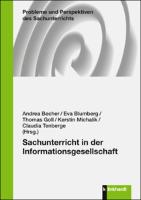Sachunterricht in der Informationsgesellschaft
| dc.contributor.editor | Becher, Andrea | |
| dc.contributor.editor | Blumberg, Eva | |
| dc.contributor.editor | Goll, Thomas | |
| dc.contributor.editor | Michalik, Kerstin | |
| dc.contributor.editor | Tenberge, Claudia | |
| dc.date.accessioned | 2022-03-02T13:51:53Z | |
| dc.date.available | 2022-03-02T13:51:53Z | |
| dc.date.issued | 2022 | |
| dc.identifier | OCN: 1308759533 | |
| dc.identifier.uri | https://library.oapen.org/handle/20.500.12657/53186 | |
| dc.description.abstract | As part of the information and knowledge society, children and adults are both affected by and involved in the digital transformation. The extent to which information and knowledge can actually be accessed, used and shaped by everyone is a question of educational theory and subject didactics. Pupils, teachers, students and trainee teachers must be supported in opening up the possibilities and limits of the information society, in reflecting on them and in recognising and developing options for action, orientation and skills. In the present volume, subject matter teaching in the information society is examined from the perspectives of subject matter didactic reconstruction, media education and informatics education; the question of appropriate locations, media and technologies is also addressed, as are projects in university teacher training and perspective-related approaches. (DIPF/Orig.) | en_US |
| dc.language | German | en_US |
| dc.relation.ispartofseries | Probleme und Perspektiven des Sachunterrichts | en_US |
| dc.subject.classification | thema EDItEUR::J Society and Social Sciences::JN Education::JNL Schools and pre-schools::JNLB Primary and middle schools | en_US |
| dc.subject.other | Sachunterricht, Informationsgesellschaft, Fachdidaktik, Medienpädagogik, Primarbereich, Elementarbereich, Medienkompetenz, Digitalisierung, Digitale Medien, Didaktische Rekonstruktion, Unterrichtsgestaltung, Ungleichheit, Flucht, Jugendlicher, Informatik, Digitaltechnik, Informatikunterricht, Mediendidaktik, Lehrerbildung, Lehrerausbildung, Lehramtsstudent, Lebenswelt, Außerschulischer Lernort, Gedenkstätte, Lernort, Geschichte <Histor>, Reflexion <Phil>, Bildung für nachhaltige Entwicklung, Lehrer, Einstellung <Psy>, Aufgabenstellung, Lernplattform, Zeitzeuge, Historisches Lernen, Lehr-Lern-System, Hochschullehre, Selbstkonzept, Selbsteinschätzung, Lehr-Lern-Prozess, Denken, Politische Bildung, Video, Geografie, Projekt, Virtuelle Realität, Naturwissenschaftlicher Unterricht, Medieneinsatz, Empirische Forschung, Test, Rasch Analysis, Explorative Studie, Instruction in natural science subjects, Primary school science and social studies, Information society, Specialized didactics, Subject didactics, Media education, Media pedagogics, Primary education, Primary level, Elementary education sector, Media competence, Media skills, Digitalization, Flight, Running away, Adolescent, Computer science, Informatics, Computer science lessons, Computer studies, Teaching of computer science, Media didactics, Teacher education, Teachers' training, Teacher training, Student teachers, Memorial, Memorial place, Educational setting, History, Teacher, Task definition, Task setting, Higher education lecturing, University lecturing, University teaching, Self concept, Self-rating, Teaching-learning process, Reasoning, Thinking, Citizenship education, Civic education, Political education, Geography, Project, Projects (Learning Activities), Natural sciences lessons, Teaching of science, Deployment of media, Use of media, Empirical research | en_US |
| dc.title | Sachunterricht in der Informationsgesellschaft | en_US |
| dc.type | book | |
| oapen.abstract.otherlanguage | Kinder wie Erwachsene als Teil der Informations- und Wissensgesellschaft sind zugleich Betroffene wie Beteiligte der digitalen Transformation. Inwieweit Informationen und Wissen tatsächlich für jeden zugänglich, nutzbar und gestaltbar sind, stellt eine bildungstheoretische sowie fachdidaktische Frage dar. Schüler*innen, Lehrer*innen, Studierende, Lehramtsanwärter*innen sind dabei zu unterstützen, sich Möglichkeiten und Grenzen der Informationsgesellschaft zu erschließen, diese zu reflektieren sowie Handlungs-, Orientierungsoptionen und -fähigkeiten zu erkennen und auszubilden. Im vorliegenden Band wird Sachunterricht in der Informationsgesellschaft aus den Blickwinkeln der sachunterrichtsdidaktischen Rekonstruktion, der Medienbildung und der informatischen Bildung beleuchtet; die Frage nach entsprechenden Orten, Medien und Technologien werden ebenso thematisiert wie auch Projekte in der universitären Lehrerbildung als auch perspektivenbezogene Zugangsweisen. (DIPF/Orig.) | en_US |
| oapen.identifier.doi | 10.35468/5935 | en_US |
| oapen.relation.isPublishedBy | 9a084ee3-3f86-4be2-81d6-89c9fbc5f173 | en_US |
| oapen.relation.isbn | 9783781524965 | en_US |
| oapen.series.number | 32 | en_US |
| oapen.pages | 159 | en_US |
| oapen.place.publication | Bad Heilbrunn | en_US |

